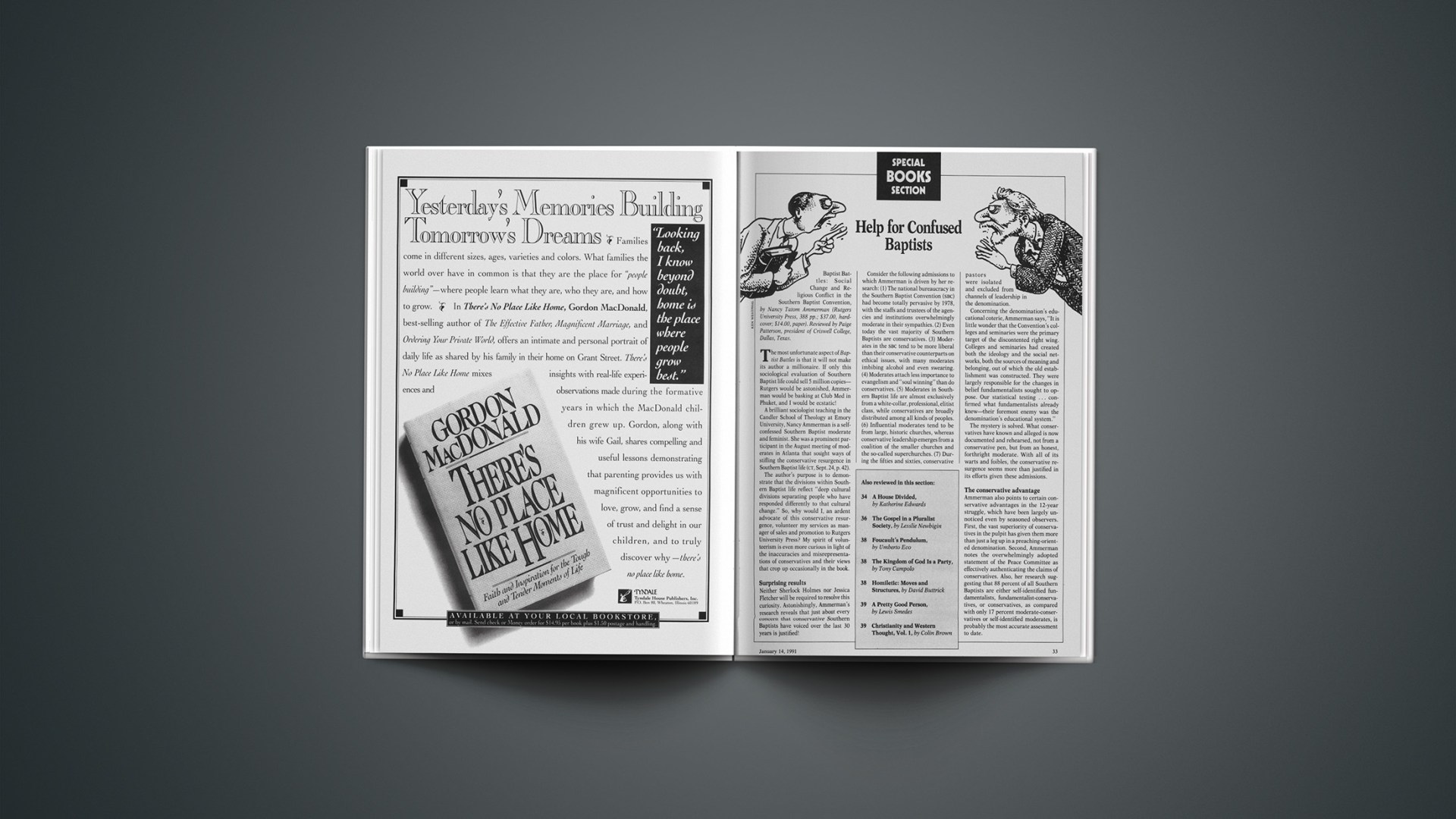Baptist Battles: Social Change and Religious Conflict in the Southern Baptist Convention, by Nancy Tatom Ammerman (Rutgers University Press, 388 pp.; $37.00, hardcover; $14.00, paper). Reviewed by Paige Patterson, president of Criswell College, Dallas, Texas.
The most unfortunate aspect of Baptist Battles is that it will not make its author a millionaire. If only this sociological evaluation of Southern Baptist life could sell 5 million copies—Rutgers would be astonished, Ammerman would be basking at Club Med in Phuket, and I would be ecstatic!
A brilliant sociologist teaching in the Candler School of Theology at Emory University, Nancy Ammerman is a self-confessed Southern Baptist moderate and feminist. She was a prominent participant in the August meeting of moderates in Atlanta that sought ways of stifling the conservative resurgence in Southern Baptist life (CT, Sept. 24, p. 42).
The author’s purpose is to demonstrate that the divisions within Southern Baptist life reflect “deep cultural divisions separating people who have responded differently to that cultural change.” So, why would I, an ardent advocate of this conservative resurgence, volunteer my services as manager of sales and promotion to Rutgers University Press? My spirit of volunteerism is even more curious in light of the inaccuracies and misrepresentations of conservatives and their views that crop up occasionally in the book.
Surprising Results
Neither Sherlock Holmes nor Jessica Fletcher will be required to resolve this curiosity. Astonishingly, Ammerman’s research reveals that just about every concern that conservative Southern Baptists have voiced over the last 30 years is justified!
Consider the following admissions to which Ammerman is driven by her research: (1) The national bureaucracy in the Southern Baptist Convention (SBC) had become totally pervasive by 1978, with the staffs and trustees of the agencies and institutions overwhelmingly moderate in their sympathies. (2) Even today the vast majority of Southern Baptists are conservatives. (3) Moderates in the SBC tend to be more liberal than their conservative counterparts on ethical issues, with many moderates imbibing alcohol and even swearing. (4) Moderates attach less importance to evangelism and “soul winning” than do conservatives. (5) Moderates in Southern Baptist life are almost exclusively from a white-collar, professional, elitist class, while conservatives are broadly distributed among all kinds of peoples. (6) Influential moderates tend to be from large, historic churches, whereas conservative leadership emerges from a coalition of the smaller churches and the so-called superchurches. (7) During the fifties and sixties, conservative pastors were isolated and excluded from channels of leadership in the denomination.
Concerning the denomination’s educational coterie, Ammerman says, “It is little wonder that the Convention’s colleges and seminaries were the primary target of the discontented right wing. Colleges and seminaries had created both the ideology and the social networks, both the sources of meaning and belonging, out of which the old establishment was constructed. They were largely responsible for the changes in belief fundamentalists sought to oppose. Our statistical testing … confirmed what fundamentalists already knew—their foremost enemy was the denomination’s educational system.”
The mystery is solved. What conservatives have known and alleged is now documented and rehearsed, not from a conservative pen, but from an honest, forthright moderate. With all of its warts and foibles, the conservative resurgence seems more than justified in its efforts given these admissions.
The Conservative Advantage
Ammerman also points to certain conservative advantages in the 12-year struggle, which have been largely unnoticed even by seasoned observers. First, the vast superiority of conservatives in the pulpit has given them more than just a leg up in a preaching-oriented denomination. Second, Ammerman notes the overwhelmingly adopted statement of the Peace Committee as effectively authenticating the claims of conservatives. Also, her research suggesting that 88 percent of all Southern Baptists are either self-identified fundamentalists, fundamentalist-conservatives, or conservatives, as compared with only 17 percent moderate-conservatives or self-identified moderates, is probably the most accurate assessment to date.
Also reviewed in this section:
A House Divided, by Katherine Edwards
The Gospel in a Pluralist Society, by Lesslie Newbigin
Foucault’s Pendulum, by Umberto Eco
The Kingdom of God Is a Party, by Tony Campolo
Homiletic: Moves and Structures, By David Buttrick
39 A Pretty Good Person, by Lewis Smedes
Christianity and Western Thought, Vol. 1, by Colin Brown
The book has its mistakes, but most of these are unrelated to the author’s research. The errors usually occur when she shifts to her own opinions or chronicles the usual rhetoric concerning such demonstrably false accusations as conservative mass busing of voters or the allegations that conservatives attempt to undermine individual freedom.
Ammerman stooped to the reporting of moderate paranoia about classroom lectures being clandestinely taped and then shipped off to Dallas. But this is the worst of it: Ammerman does not succeed in her purpose of demonstrating that the current controversy arises out of cultural differences. But the book is still invaluable.
Every “movement conservative” in the Southern Baptist fellowship should purchase two copies of this book. Read one and mark it carefully. It will prove extraordinarily helpful. Give the other copy to a confused Baptist whose theology tends to be orthodox but for whatever reasons has aligned himself with the moderates. If he can still waltz with the moderates after reading this book, then let the orchestra play!










